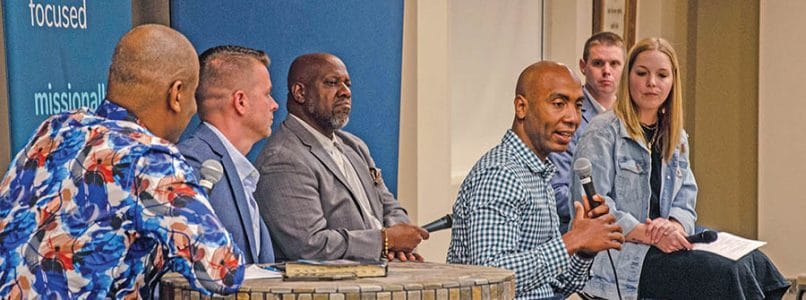GRAPEVINE—A five-person panel advocated understanding, intentionality and proactivity when confronting racial issues dividing the body of Christ. The April 13 discussion was sponsored by the Southern Baptists of Texas Convention in Grapevine and attended by online and in-person registrants.
Tony Mathews, pastor of North Garland Baptist Fellowship and SBTC interim senior strategist for Missional Ministries, moderated the afternoon panel which included Michael Criner, pastor of Rock Hill Baptist Church near Tyler; Todd Kaunitz, pastor of New Beginnings Baptist Church in Longview; Joe Ogletree, pastor of Image Church in Houston; Kasi Pruitt, adoption and foster care coordinator for Lakepointe Church, Rockwall; and Mike Satterfield, teaching pastor at Fielder Church in Arlington.
Mathews, Satterfield and Ogletree are African American. Kaunitz, Criner and Pruitt are Caucasian, with Pruitt the mother of a multiracial family.
The discussion was designed to motivate action, Mathews said. He asked questions of panelists along the topics indicated below. What follows is a summary of the conversation. The discussion was serious, yet cordial and respectful.
Their hopes and fears about the panel’s work
“My hope is that we become real and not reactionary, but intentional and proactive,” Satterfield said.
Criner noted his desire that the group would create “light and not heat,” while Kaunitz said he hoped the conversation would not be “hijacked by politics,” too often an unwelcome distraction.
“I pray that this is not just something for show,” Ogletree said, adding, “As African Americans, we’re tired. … We want to see some progress. We want to see some steps. I am here hopeful, and I want to be part of the solution.”
On national and SBC tensions, CRTI
Critical Race Theory and Intersectionality proved not to be divisive in the panelists’ churches.
Ogletree said that until the [Nov. 30, 2020] statement issued by the SBC seminary presidents, CRTI was “not even a topic” at his mostly Black church. Neither was Marxism (to which CRTI is frequently linked). Still, he called the seminary presidents’ statement “hurtful,” since it was not part of an ongoing conversation, and he urged “more listening” and “less labeling.”
“Some of the hot topic discussions that are happening within the convention aren’t happening in our pews,” Kaunitz said, echoing Ogletree’s observation about CRTI and adding that people are concerned about injustice, not labels.
“What our church is concerned about is unarmed Black men dying at the hands of police,” Ogletree replied when Mathews confirmed that CRTI was not the issue. “Our church is concerned about the silence of our friends.”
Satterfield offered a new acronym, not WWJD but WDJD: What Did Jesus Do? “[Jesus] came in humility and he came to effect change for unity, and I want to look just like him,” he explained.
Pruitt affirmed the dangers of making racial reconciliation too political.
“Heaven is going to be a diverse kingdom. All different people worshiping Jesus together. Why would we not want this now on earth?” she asked.
Barriers impeding racial harmony
The panel offered the following, with suggestions for the sort of “actionable” responses Mathews urged.
1. Lack of trust: Satterfield noted that people don’t trust others of varying backgrounds, income levels or even sports affinities. “This lack of trust has caused individuals to come to church with fists up instead of arms open,” he said, calling for believers to break the “wall of distrust.”
2. Mistaken identity: Criner argued that Christians are often “not confident enough in our identity in Christ” to submit ourselves. Pride spawns posturing, but instead, like Paul in Galatians 2:20, we must die to ourselves.
“Dead men don’t bow up. If they do, run,” Satterfield quipped.
3. Lack of historical understanding. “There have been no good old days since the fall [of man],” Pruitt said, suggesting white believers sometimes lack historical context regarding what other races have endured. “The good old days [for some] were also the days of segregation,” she added.
Ogletree agreed with Pruitt’s assessment about a lack of education regarding slavery, segregation and Jim Crow: “1964 was not that long ago, the Civil Rights Act.” He added that the SBC started because of slavery and the South was its epicenter, yet affirmed, “The beauty of what the gospel does is that [past] doesn’t have to define you.”
We must be willing to have this conversation about history, Kaunitz said: “It’s not about living and wearing the sin of yesterday. It’s about being sympathetic [to] the sin of yesterday and its effects today.”
“Many of us are not sensitive of the fact that many are carrying the scars of what their fathers have done,” Satterfield said. “We jump to protect ourselves instead of listening to understand. Our churches need to repent individually and in community, collectively, so we can start now and really use what’s become a cliché for truth: the best is yet to come.”
4. Anti-social media. All panelists acknowledged the dangers of social media.
“When social media determines the platform and culture determines the tone, it’s never going to end well,” Kaunitz said.
Owning your bias
“I really do see our family as a picture of heaven because it’s diverse and that’s what it’s going to look like,” Pruitt said. She noted the challenges of having to hold conversations with her adopted kids that she did not have to have with her older biological daughters.
“When it comes to the context of church, I want a family,” Satterfield said, and this involves embracing differences: “We don’t laugh at the same jokes. We don’t like the same foods. There are a lot of different biases that exist just culturally from your upbringing. You have to learn that getting along is messy.”
“When you start having conversations with people who grew up in a different ethnicity than you did, you learn,” Criner agreed.
Kaunitz noted his church’s intentionality toward diversity, with its multi-ethnic staff. Having to swallow his pride and “hear things that are hard” has been challenging,
he said.
Ogletree admitted that privilege is a “hot word,” and that he had grown up in privilege, in a good home with his middle-class family, only discovering differences in college. “We all have biases,” he said, adding, “The answer to bias is to listen.”
Pruitt agreed that bias exists for all and it must be surrendered. She admitted that walking through the adoption of most of her children with their biological moms exposed biases she held. She warned against preconceptions and urged people to see others as made in the image of Christ. She also said the adoption process revealed her own previously unrecognized privilege.
Avoid the broad brush
Mathews told a story from the early days of his church decades ago. A white man who had come to his office to ask about the church had refused to shake Mathews’ offered hand. Discouraged, Mathews wondered if his idea of a multiracial ministry would work. An hour passed, and in walked a white couple.
“The lady hugged me. The man talked me to death. They were so nice and friendly. I learned something from that: I can’t paint with a broad brush,” he recalled.
Satterfield suggested another acronym: DIMTY: “Do I Matter To You?” To matter is a deep-seated need of humankind: “I acknowledge you matter to God. You matter for eternity.”
Ogletree cautioned against minimizing the pain or sin carried from generation to generation.
“Within the African American community, racism has always been the topic,” he said, pointing out that the Black Lives Matter cause has grown because “a black life has really never mattered.” Events such as the killing of George Floyd trigger memories of years of mistreatment among Blacks and provoke reactions akin to PTSD.
“The answer is relationship,” Kaunitz said, deep, honest conversation that reveals the pain another person has experienced. “You can’t find [perspective] without relationship.”
Ministering to all races
How does one minister to white congregants who feel they are being blamed repeatedly for race problems? Mathews asked.
Remember “Jesus is our substitute, but he is also our example,” Criner said, later adding, “We are to rejoice with those who rejoice and weep with those who weep.” He said he tells people questioning why they must apologize, “There’s no they. It’s us. If they are part of the body of Christ, they are us.”
“Usually people who ask that question often don’t have a lot of relationships with people who don’t look like them,” Pruitt said, advising others to pursue such friendships to hear their stories.
“Just like I’ve got to listen to my Black friends as they process, I’ve got to listen to my white friends as well,” Kaunitz said.
Bridge-building tips
Becoming all things to all people builds bridges, Satterfield said, whether it means preaching in chaps and a cowboy hat at a Jasper, Texas, cowboy church or donning a “19-piece suit” for a New York church.
“It is enabling the Spirit in his wind to blow me wherever God wants me to go,” Satterfield continued. Assignments can be uncomfortable, and you must realize you can’t “fix” people, he said, adding, “I plant, I water, and then I lift my hands and watch God bring the increase.”
Criner advocated purposeful church planting, noting that his church is investing in a predominantly Black church start. He also recommended involvement in foster and respite care.
The key is to be “slow to anger,” Ogletree said. “I grew up with my own blinders. With people in my congregation, I have to listen more and stop judging and listen to their circumstances. I want to reach out. But at this point, it would be nice to have someone reach in. I need someone to hear me and understand me.”
Pruitt again urged the development of intentional relationships, noting that Gen Z is more diverse than prior generations and the trend will continue. She also cautioned parents to be bridge builders for their kids at home and not to criticize other ethnicities, for the children are watching.
About staying in the SBC
During a Q&A session afterwards, panelists affirmed support of the SBC.
Satterfield likened abandoning the SBC to abandoning family. Criner, Kaunitz and Pruitt noted doctrinal unity with the Baptist Faith & Message 2000 and missions.
“I am hopeful. I not only want to see change, I want to be part of change,” Ogletree said.
“This is not the end. This is the beginning,” said Jim Richards, SBTC executive director, closing the meeting in prayer.
Watch the panel discussion at sbtexas.com/racialharmony


















